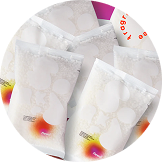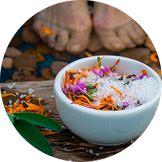How Quickly Does Vitamin D Work For Fatigue (Fast Answer): It can take anywhere from a few weeks to a few months for Vitamin D to work for fatigue. It all depends on your baseline deficiency, how you fuel your body with Vitamin D (and other nutrients), and the additional lifestyle changes you make.
Whether you’re struggling with brain fog or muscle weakness, difficulty getting out of bed, constant irritability, or just an overall feeling of exhaustion, no matter how much rest you get - fatigue shows up in many forms. It’s a whole lot more than just being tired.
There’s a strong connection between low vitamin D and fatigue, though. So how does vitamin D help with fatigue - and more importantly, how quickly does Vitamin D work for fatigue?
There’s no one-size-fits-all answer. It depends on baseline vitamin D levels, dosage and form, your metabolism, and how consistent you are in taking Vitamin D - along with other lifestyle changes you make to fight fatigue head-on.
The most realistic timeline, though, is 4-12 weeks of consistently providing your body with the bioavailable Vitamin D it needs. You might even notice a difference in the first 1-2 weeks.
The best thing you can do to get back to feeling normal quickly is to incorporate our Fatigue Defeating Bath Soak. This energizing bath soak brings you magnesium, which plays a vital role in activating and metabolizing Vitamin D so your body can use it.
But you also get Tryptophan, Potassium, and Vitamin B6 to help beat mind fog, restore restful nights, and catch more energy. You can pair it with our muscle bath soak, which actually has Vitamin D in it as well!
There’s something for you at Flewd Stresscare if you’re ready to put fatigue in the past. Shop now!
“What my tired body needs! I love these. I'm a solo mama and these have been a lifesaver for tending in short bursts of time.” - Elyza
“I have been using FLEWD a few times a week for 3 months now. I am noticing that I am feeling lighter, less stressed, less easily frustrated and annoyed. My mood is better, and my ability to handle stressful situations is increasing. I just feel better.” - Carrie
“I'm perimenopause, so naturally I'm exhausted, stressed and usually carry a lot of tension. I've been using these soaks for about 3 weeks and my massage therapist who I see every other week noticed a significant different in the tension in my neck and upper back!” - Corin
What is Fatigue?
First, let’s differentiate between feeling fatigued vs tired. They’re very different. Fatigue is a persistent sense of exhaustion that doesn’t go away with sleep or rest. It’s your body and brain running on empty, often without a clear reason.
Everyone gets tired from time to time. But true fatigue runs a lot deeper. It lingers and interferes with how you think, move, and function in your day-to-day life.
There are two main types of fatigue, and they have a habit of overlapping.
- Physical fatigue is when your muscles feel weak, heavy, or slow to recover. Walking up stairs feels like a workout. You’re not just sleepy - your body is begging for a break.
- Mental fatigue shows up as brain fog, low motivation, trouble concentrating, or that “checked out” feeling. Your brain struggles to stay alert, even if your body’s technically fine. You might be staring at a screen but unable to process what you're reading.
And when both hit at once? That’s when fatigue really starts to derail your quality of life. So, how did you get here? It could be something like PCOS fatigue, or it could just be simple burnout. Common causes include:
- Nutrient deficiencies, especially low vitamin D, iron, or B vitamins
- Poor sleep quality or disrupted circadian rhythm
- Chronic stress and anxiety, which drain your energy over time
- Hormonal imbalances, like thyroid issues or low cortisol
- Lack of physical activity or too much of it without proper recovery
- Hidden infections or inflammation that tax your immune system
But you might already have a hunch you’re struggling with Vitamin D deficiency, and that this could be the culprit behind your unexplained fatigue. So, does vitamin D help with fatigue?
Does Vitamin D Help With Fatigue?
Low vitamin D definitely could be amplifying the problem if you’re constantly dragging through the day even after a full night’s sleep.
Deficiency in this nutrient is more common than most people realize, especially if you live in a colder climate, wear sunscreen religiously, or spend most of your time indoors. That’s because the best way to absorb it is through direct sunlight. Deficiency could look like:
- General tiredness or sluggishness
- Low mood or irritability
- Frequent colds or feeling “run down”
- Muscle aches, weakness, or heavy limbs
- Brain fog and difficulty focusing
Yes - a lot of the same symptoms as fatigue!
So does vitamin D help with fatigue? We think so. Vitamin D plays an important role in energy metabolism, hormone regulation, and immune health. Low levels throw off your internal balance and leave your body running on low power mode.
On the other hand, supplementing with the right form (typically D3, not D2) helps restore normal levels, which supports mitochondrial function (your cells' energy engines), improves muscle performance, and can lift mood. That trifecta may improve both mental and physical fatigue
But, it’s important to confirm you actually have a Vitamin D deficiency first. Get your blood work done and make sure the issue isn’t something else. We’ll talk about this in a few moments. But how quickly does Vitamin D work for fatigue?
How Quickly Does Vitamin D Work For Fatigue?
Like we said from the get-go, there’s no one-size-fits-all answer to how quickly Vitamin D will help you overcome fatigue. Just as there’s no straightforward answer to, how long does it take to recover from burnout? Some of the factors at play include:
- How deficient you are to begin with: The lower your baseline, the longer it may take to restore optimal levels.
- Your supplement dose: Low doses (like 400-800 IU) may take months to move the needle, while therapeutic doses (5,000 IU or more under supervision) work faster.
- Absorption factors: Vitamin D is fat-soluble, so if you take it without fat or have gut absorption issues (like IBS or celiac), your body may not utilize it efficiently.
- Consistency: Skipping doses or switching products frequently slows progress.
There are a lot of lifestyle changes you can make to speed up the timeline to feeling like yourself again - such as getting more sunlight and regularly using a magnesium bath soak to supercharge Vitamin D uptake (and restore other vital nutrients at the same time).
But how quickly does Vitamin D work for fatigue in general? Most people who are vitamin D deficient notice improvements in fatigue, mood, and overall energy within 2 to 6 weeks. Some report subtle shifts in mental clarity or sleep quality even sooner.
However, it can take 2 to 3 months to fully replenish stores and feel the full benefits, especially if your deficiency was severe. We strongly recommend you plan on committing for at least 60 days before making any changes to your regimen.
You shouldn’t play the guessing game, either. Get your blood work before making changes, and then re-check it after a month or two to see if you’re on the right track. We’ll share more tips on overcoming low Vitamin D fatigue below.
The Best Way to Overcome Low Vitamin D Fatigue
Whether you’re trying to figure out how to combat fatigue from birth control or you just want to start practicing general chronic fatigue syndrome self-care, supplementing with Vitamin D is a great starting point.
That said, a lot of people go about it wrong - ordering the first Vitamin D supplement they come across. We’ve actually found a very different approach works better, which is what makes our epsom salt alternative so popular for fighting fatigue.
But before we can talk lifestyle changes, we need to confirm low Vitamin D is the problem.
Find Out For Sure if Vitamin D Levels Are Low
A simple blood test (usually called 25-hydroxyvitamin D) is the only reliable way to know where you stand. Most experts consider anything below 30 ng/mL to be low, though some argue optimal levels are closer to 50 ng/mL.
If you’re not deficient in Vitamin D, that doesn’t necessarily mean your body is getting enough. It could be that you’re not getting enough magnesium, which supports Vitamin D uptake and activation. Or, your fatigue could be caused by something else entirely.
But let’s move forward, assuming you’re dealing with low Vitamin D fatigue. What now?
Choose the Right Vitamin D Supplement
Not all vitamin D is created equal. We’ve touched on this already, but go with Vitamin D3 (cholecalciferol) instead of D2. You should also focus on fat-soluble delivery, meaning you need to take your daily dose(s) with food that has plenty of fat.
As for the optimal dosage, that’s something you’ll have to figure out on your own since it’s totally dependent on how severe your deficiency is. Generally speaking, a dose between 2,000-5,000 IU daily is safe. The problem is, it may not actually be effective.
You see, oral supplements can only do so much for overcoming low Vitamin D fatigue. These pills, capsules, or powders are slow to absorb for many people, especially if gut health or fat metabolism is compromised.
We’ve found in our own personal experience that Vitamin D absorbs best through the skin - that’s how your body converts sunlight into Vitamin D, after all. That’s why we strongly advise you try a stress relief bath soak instead.
Why Our Magnesium Soak is the Best Option
Vitamin D doesn’t act alone. Magnesium is required for the body to activate and use Vitamin D efficiently. Yet, most of us are low in that too! So maybe the problem isn’t necessarily Vitamin D, but your body being unable to make use of it. That’s why topical support can make a huge difference, especially when you choose a soak that replenishes multiple nutrients at once.
Our Fatigue Defeating Soak at Flewd Stresscare combines bioavailable magnesium chloride, tryptophan, potassium, and vitamin B6 - all of which are vital for fighting burnout.
Or if you want something containing both magnesium and Vitamin D, go with our Ache Earsing Soak. It has this dynamic duo along with Vitamin C and Omega-3s to loosen up tight, fatigued muscles while supporting vitamin D levels directly.
All our soaks are crafted with 99% natural ingredients - no toxins, parabens, or other junk that only holds you back from feeling your best. You’ll love incorporating them into your self-care ritual, too. Just draw a warm bath, dump the packet in, and enjoy 20 minutes of you-time!
Over 100,000 happy customers and counting rely on our soaks to keep stress and its harmful effects, such as fatigue, at bay. Use them 3 times a week and you’ll be amazed as you feel the fatigue lift away!
Combine With Lifestyle Changes
Supplements and soaks work best when you also address what’s draining your tank. Here are some lifestyle changes you might want to make while you’re at it:
- Get outside for natural light exposure whenever possible
- Prioritize deep sleep and screen-free wind-downs
- Eat whole foods rich in magnesium, healthy fats, and protein
- Move your body daily - even a short walk resets your system
These small shifts make a big difference in how you feel physically and mentally.
When Vitamin D Isn’t the Answer
If you’ve given it a full month or two and still don’t notice any change in how you feel, it’s possible your fatigue is rooted in something else entirely. It could be tied to:
- Iron deficiency or anemia
- Thyroid dysfunction
- Long-term stress or adrenal burnout
- Blood sugar swings
- Sleep disorders
Your body’s not lazy. It’s trying to tell you something. And while vitamin D might be part of the puzzle, it’s not always the only piece. Eventually, you might have to get professional guidance. But, starting with our Fatigue Defeating Soak is an excellent first step!
Bringing Our Vitamin D Fatigue Guide to a Close
If you’ve been running on empty and wondering why rest alone isn’t cutting it, low vitamin D could be the missing link. So, how quickly does Vitamin D work for fatigue? In closing, it can take anywhere from a couple of weeks to a few months to feel better.
Remember, oral supplements aren’t your only option - or the smartest one, for that matter. Topical treatments that replenish multiple fatigue-fighting nutrients may offer the support your body is really asking for. So, take the next step towards beating fatigue at Flewd Stresscare!
























































